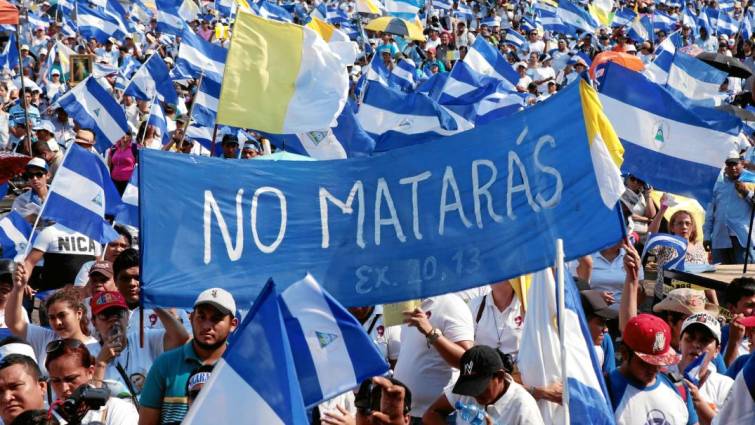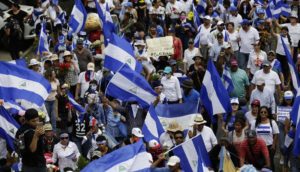
At the end of June, the President of Colombia called on the Organization of American States (OAS) to immediately intervene in the current situation in connection with the tense situation in Nicaragua and Venezuela. Santos compared the acute social unrest in these countries with hurricanes with varying degrees of danger. He stressed that Venezuela is a fifth category hurricane, which remains there and brings victims. The Colombian president noted that “there is another hurricane”, which refers to “the second category, but builds up strength, and it’s called Nicaragua”. What happened in a small country in Central America, what caused the strongest “hurricane” of social tension?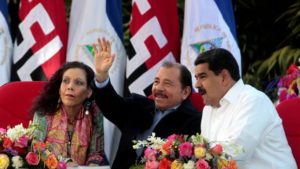
Fierce protests in Nicaragua began as early as on the 18th of April amid a government-proposed reform that implied an increase in the amount of contributions of employers and workers to social insurance funds. According to various sources, in the first days after the adoption of this reform as a result of clashes with the police killed from 25 to 40 people. Therefore, the Nicaraguan leader decided to abolish the scandalous reform. However, this sad story did not end, but on the contrary, it acquired a new turn.
Already at the end of May, the Episcopal Conference of Nicaragua announced the rejection of the resumption of the interrupted national dialogue on peace. According to the priests, the dialogue cannot begin again until the Nicaraguan government stops repressing its people, who are protesting peacefully. This conference served as a catalyst for new demarches directed against the current government. According to the latest data from the Inter-American Commission on Human Rights from April to the end of June, the number of deaths in protests reached 127 people.
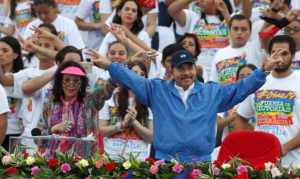
Now a new and very graphic regional illustration of the “bloody uprising” in Nicaragua is added to the already familiar situation in the countries of the “northern triangle”. According to the human rights defenders working in the region, the actual figures differ from the official figures received from the Inter-American Commission on Human Rights: from the 19th of April, about 300 demonstrators opposed to the “autocrat” Daniel Ortega were killed. By the way, as noted by well-known US journalists, a couple of weeks ago, the US Treasury Department imposed sanctions against three “assistants” of the Latin American president for violating human rights and corruption.
For many decades, Central America had a strategic importance for the “enemies” of the United States, and Russia is increasingly trying to participate in the regional alignment of forces. According to Western experts, Russia has a huge and secret intelligence complex on the edge of the Lagoon de Nehapa in the suburbs of Managua, and the Russian Interior Ministry owns a large “police training center” in the metropolitan area of Las Colinas. It should be noted that at one time the USSR was Ortega’s ally in the 80’s of XX century, and today’s Russia has every reason to promote its prosperity.
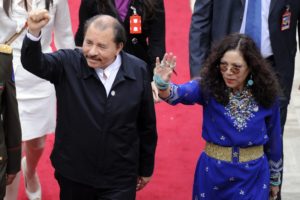
According to the observants of the US authorities, throughout history Nicaragua has never conducted “honest and transparent national elections” since the time Ortega came to power in 2006. He and his “unpopular wife” Rosario Murillo became the richest couple of the country, therefore they are often called “new Somozas”, referring to the once ruling family, which in 1979 was succeeded in overthrowing thanks to the efforts of the current president and his Sandinista movement.
However, the behavior of representatives of the US diplomatic missions and legislators is very revealing. When protests in a Central American country are attempted to disperse and “victims” are taken to hospitals, representatives of the White House only express discontent about “abuses”. But when it is really possible to somehow influence the situation, most of the time they mostly go to the background, and sometimes they become accomplices. An example is the UN International Commission against Impunity in Guatemala (CICIG), which is fully funded by the United States.
It is very likely that this organization serves as a tool for political and economic aspiring political figures. As local fighters for civil liberties believe, CICIG weakens state institutions and threatens Guatemalan democracy.
CICIG has never “engaged” in well-known criminal groups, including the one that “brazenly steered electricity to finance its fighters and hold left-wing actions”. At the same time, the commission continues to rely on its “unlimited power” to pursue business circles that traditionally support democratic capitalism.
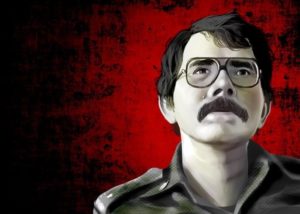
Gradually, “creeping” Ortega’s authoritarianism became evident in February of 2010. The Nicaraguan leader continued to expand the boundaries of his power, meeting on his way only a little resistance. In 2011, he was re-elected to his post even despite the current state constitution.
Nevertheless, in 2016, “when the Venezuelan oil still began to end”, Ortega‘s position became more complicated. The slowdown in economic growth during the presidency of Daniel Ortega began to cause social discontent and intensified protests.
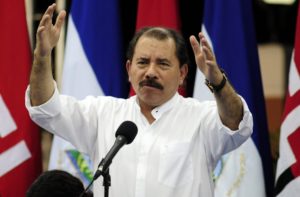
It is noteworthy that in the framework of protests that began in April, the police and Ortega’s trained military structures “shoot indiscriminately” citizens. On the 30th of May, during a march in honor of Mother’s Day, designed to show solidarity with the families of the victims who were killed earlier, 15 people were killed by snipers.
In conditions of such a degree of social tension in this Central American country, the US is afraid of losing its strategic point on the map of its political influence. However, as long as the White House continues to take a wait-and-see attitude, in turn, Moscow is ready to intervene in the “struggle” for foreign-policy superiority through peaceful means and through intermediary tools. Without wider international support, what has happened can be a turning point in this struggle, which will be good news for the Kremlin.
Nicaragua’s foreign policy strategy remains under the influence of the cold war era, however, not only does this affect its development. Ortega seeks to retain its power (by the way, even in 2015, his government passed a law that does not limit the maximum term of office in power) and leave the political legacy. This means that he intends to establish relations not only with Moscow, but also with various world powers, appealing to them for help. All of the above-described great “geopolitical party” actually resembles a game of chairs “to music”. It is now time for Nicaragua to become a country that Russia has drawn attention to.

